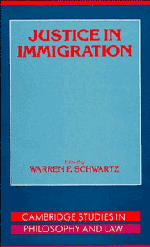Book contents
- Frontmatter
- Contents
- List of contributors
- 1 Immigration, welfare, and justice
- 2 Citizenship, the demands of justice, and the moral relevance of political borders
- 3 A two-country parable
- 4 Immigration, identity, and justice
- 5 Immigration, justice, and culture
- 6 Fear and loathing at the border
- 7 Immigration policy in liberal political theory
- 8 The welfare economics of immigration law: a theoretical survey with an analysis of U.S. policy
- 9 Just borders: normative economics and immigration law
- 10 Some caveats on the welfare economics of immigration law
- 11 The case for a liberal immigration policy
10 - Some caveats on the welfare economics of immigration law
Published online by Cambridge University Press: 18 March 2010
- Frontmatter
- Contents
- List of contributors
- 1 Immigration, welfare, and justice
- 2 Citizenship, the demands of justice, and the moral relevance of political borders
- 3 A two-country parable
- 4 Immigration, identity, and justice
- 5 Immigration, justice, and culture
- 6 Fear and loathing at the border
- 7 Immigration policy in liberal political theory
- 8 The welfare economics of immigration law: a theoretical survey with an analysis of U.S. policy
- 9 Just borders: normative economics and immigration law
- 10 Some caveats on the welfare economics of immigration law
- 11 The case for a liberal immigration policy
Summary
In Chapter 8 of this volume, Sykes sets out the basic economic argument that global welfare increases if people are free to migrate when the gains from migrating exceed the costs. With the usual caveats, which Sykes provides, this argument is generally accepted by economists. It is quite similar to the argument used in favor of free international trade. According to this argument, immigration should be restricted only if it is in some way counter to the national interest, that is, if immigrants gain at the expense of natives. Even this argument for restricting immigration can be debated if the social welfare function is allowed to include individuals outside the country. In addition to providing theoretical arguments for less restrictive immigration, Sykes presents a policy prescription that includes expanding the number of temporary visas for unskilled workers as a way to stem the recent increase in illegal immigration.
The purpose of this essay is not to argue that increased immigration is bad. Immigration has been the basis for the growth of the United States throughout its history. Rather, I argue that Sykes's policy proposal is flawed, and present some arguments for the use of caution in using the simple economic model Sykes describes to support policy changes that may lead to substantial increases in immigration.
In the first section, I discuss Sykes's policy proposal for increased immigration of temporary workers in the light of recent evidence from my area of expertise, labor economics.
- Type
- Chapter
- Information
- Justice in Immigration , pp. 212 - 218Publisher: Cambridge University PressPrint publication year: 1995



